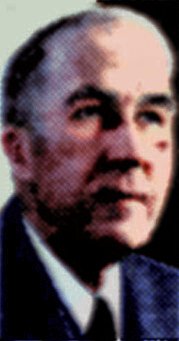The Pittsburgh Press (February 20, 1946)

Simms: Invitation to spy
By William Philip Simms
WASHINGTON – Joseph E. Davies’ dictum upholding Russia’s right “to steal our military secrets,” as one congressman put it, fell on Washington like an unexpected bucket of icewater. Many agreed with Rep. Gwinn, New York Republican, that it was “shocking invitation to espionage” which foreigners generally will not be slow to accept.
The Davies thesis that Russia has “every moral right to seek atom bomb secrets through military espionage if excluded from such information by her former allies,” it is pointed out, has a corollary. That is if Russia possesses any such right, all of our allies have the same right. Furthermore, if they have a right to the atomic bomb, they also have a right to the blueprints of any and all of our secret weapons. And, finally, if we fail to keep our allies posted on future improvements we thereby become “by inference hostile.”
Russia, it is remarked in congressional circles, has been and remains a closed book to all foreigners. She even refused to permit American or other Allied officers to watch her military operations. American taxpayers spent billions of dollars for tanks, planes, trucks, guns and other war material for Russia, but when Washington asked authorization for American officers to observe this equipment in action, Russia turned it down.
Refused to trust us
It would have saved many lives had American experts been permitted to watch newly designed equipment under battle conditions. But Russia refused to trust us. Yet if Mr. Davies regarded this secrecy as “by inference hostile,” he is not on record as having said so.
Our former ambassador to Moscow, it is recalled, has long held Russia in high esteem for the manner in which she deals with treason and espionage as applied to herself. In November 1941, soon after the Nazis attacked Russia, he says he fell to wondering why Russia had no Quislings. And so, he wrote in the American Magazine, he began to dig back through his Moscow diary and his prewar reports to the State Department to find the reason.
Then, said he: “Suddenly I saw the picture as I undoubtedly should have seen it at the time in Russia. Much of the world construed the famous treason trials and purges from 1935 to 1938 to be outrageous examples of barbarism, ingratitude and hysteria. But it now appears that they indicated the amazing far-sightedness of Stalin and his close associates.”
‘Moral right’ to steal
Thus the scores of old line Bolsheviks, military leaders and industrial heads whom Stalin caused to be executed as traitors were guilty as Prosecutor Vishinsky charged. “In the light of present facts,” Mr. Davies concluded, “and after an examination of the record, there can be no doubt that these defendants were, directly or indirectly, in the employ of the German and Japanese high command.”
This thesis of Mr. Davies, therefore, also would seem to have a corollary. And it is this: Any nation that wishes to safeguard its national security must have the “amazing far-sightedness” of a Stalin to crack down without mercy on any espionage and treason – whoever commits it.
Presumably the Nazis believed Russia’s failure to reveal the secret of her most potent weapons – as Mr. Davies seems to think the United States should now do – was “by inference hostile.” Therefore they had “the moral right” to steal the secret for themselves. But Marshal Stalin dissented, and the “far-sighted” purges recounted by the author of “Mission to Moscow” were his answer.